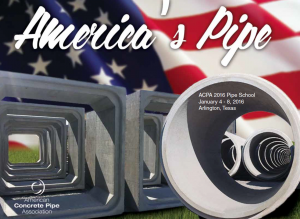Concrete Pipe News Summer 2017 – Editorial
By: Russell Tripp
American Concrete Pipe Association
These old lyrics, “Getting to know you…” from the musical “The King and I,” very much define the expectations of our elected representatives at the state and federal levels who have anything to do with America’s infrastructure – below and above ground. It has become abundantly clear by publications of the thermoplastics industry and their surrogates, and the battles fought and won by our industry reps in the halls of our legislatures, that new bills and amendments to legislation are being used to ensure that thermoplastic conduit is specified to the detriment of an engineer’s right to choose.
Low initial acquisition cost, when it is the sole consideration for specifying materials for stormwater drainage and sewage collection systems, will not beneficially contribute to America’s infrastructure. A world-class infrastructure that enables our industries to compete on a global scale, and ensures that our communities are safe and healthy should not be founded solely upon cheap products. As noted by a coalition of leading engineering and water utility organizations that design and manage the nation’s water systems, “…materials preference legislation that – under the guise of promoting “open competition” — seeks to legislate technical decisions related to pipes and other materials that should be made by licensed engineers and local communities.” Legislation designed to accommodate every pipe material in every specification for a public works project, without regard for the site conditions, environment, and product application is regressive, not progressive.
The success of the concrete pipe industry for 110 years has been based on trust and the industry’s ability to generate results in science and applied science through research and product development, and this will be our foundation for another century. The science behind our products is proven and trusted. The standards and specifications of our industry are written based on knowledge, trust, and strong relationships with strategic partners and competitors alike. The standards and specifications of our industry are written based on trust, science, and strong relationships with strategic partners and competitors alike. In recent years, the ACPA has designed and launched numerous educational events and programs including pipe schools, unified training, plant tours, professional product proficiency training, and post installation inspection courses. The successes of the educational programs are once again due to a high level of trust in the science-based knowledge being shared, and the relationships between industry and trainers.
Now we must take this trust and relationship-building to the halls of Congress and the corridors of state legislatures. The concrete pipe industry cannot sit by and expect “things” to take care of themselves merely because the ACPA and its members overall have established a strong level of trust among specifiers, regulators, rule-makers, contractors, and designers. Our legislators expect to hear from our industry because that is how our governments at the state and federal levels work in drafting bills that become legislation. As do our competitors, the concrete pipe industry retains the services of lobbyists to facilitate contact with our Nation’s leaders who serve on key committees that set rules and regulations affecting the funding of infrastructure projects. Many owners of precast facilities, large and small, help our elected officials by contributing to their education about the buried drainage systems that their decisions impact. Plant tours and community outreach events sponsored by precasters and their strategic partners are ideal knowledge-sharing and relationship-building opportunities that strengthen the trust in concrete pipe and associated precast products for storm and sanitary pipeline systems.
It is vital to the concrete pipe industry that concrete pipe producers in all states get to know their state legislators, Congresswomen and Congressmen, as well as state governors. ACPA facilitates this relationship building through its network of Regional Engineers, State Engineers, and the executive directors of state concrete pipe associations. ACPA’s engineers are experienced and ready to assist in setting up local educational programs like those that exist in many of the state concrete pipe associations and the ACPA. It is never too late to get to know local elected representatives and the infrastructure issues that they are dealing with, like securing sufficient funds for public works, resiliency of critical infrastructure, planning for extreme weather events, and actions to combat climate change. Get to know all you can about how to help them, so they can help us.



